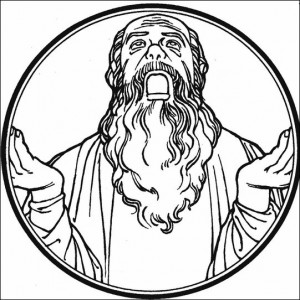Mary’s song, the Magnificat, was followed by the second Christmas song every written. It’s called the Benedictus. The opening phrase in the song, in the Latin Vulgate is, ““Benedictus Dominus Deus Israel.” It translates as “Praise be to the  God of Israel.” It’s sung by old Zechariah, the father of John the Baptist after having been silent for nine months. When the angel announced the birth of his son, John, in his old age and in his wife’s old age, his questions reflected his lack of faith. Mary’s question to the Angel Gabriel reflected curiosity as to the method of conception, but not doubt. When Zechariah wanted a “sign” the sign given was that he would remain speechless until John’s birth. When his silent months were fulfilled he’d burst out with prophetic verse. Some Scholars associate Zechariah’s period of silence with God’s silence after the closing of the Old Testament cannon with the book of Malachi.
God of Israel.” It’s sung by old Zechariah, the father of John the Baptist after having been silent for nine months. When the angel announced the birth of his son, John, in his old age and in his wife’s old age, his questions reflected his lack of faith. Mary’s question to the Angel Gabriel reflected curiosity as to the method of conception, but not doubt. When Zechariah wanted a “sign” the sign given was that he would remain speechless until John’s birth. When his silent months were fulfilled he’d burst out with prophetic verse. Some Scholars associate Zechariah’s period of silence with God’s silence after the closing of the Old Testament cannon with the book of Malachi.
There were 400 silent years from the close of the Old Testament and the Birth of Christ. These are often referred to as the “dark” and “silent” years because there was no word from God to illuminate the minds and hearts of mankind. When God first spoke he said, “Let there be light.” And there was light! John’s Gospel begins with references to the creation account and the word of God bringing forth light. He writes in Chapter 1, verses 4 and 5, “In him was life, and the life was the light of men. The light shines in the darkness, and the darkness has not overcome it.” This of course was referring to incarnation, Christ’s birth in Bethlehem. Regarding this Hughes writes, “So despite over 400 long years of darkness, the people were looking for the sunrise. There had been recent glimmers of light indicating that dawn was imminent—Gabriel’s annunciation of John to Zechariah, Gabriel’s annunciation of Jesus to Mary, the meeting of the two pregnant mothers and Elizabeth’s loud, joyful prophecy, Mary’s Magnificat, the birth of John the Baptist. These momentary flashes were signs that steady rays of messianic sunlight would soon shine from the horizon.”
It was the birth of John that truly started the break of day for the people of Israel. When John was born, Zechariah, silent for 9 months, bursts forth in a song of obedience. Even though there was no family heritage reflected the name John, he obeyed the words of the angel and named him accordingly. Being filled with the Holy Spirit, Zechariah, having been nourished his entire life on the Old Testament sang a song filled with its language. Some have identified as more than 30 references and allusions to the Old Testament in his song. His song ends with the resolution of the dark days of no Word from God. The last two verses say, “because of the tender mercy of our God, whereby the sunrise shall visit us from on high to give light to those who sit in darkness and in the shadow of death, to guide our feet into the way of peace” (Luke 1:78-79).